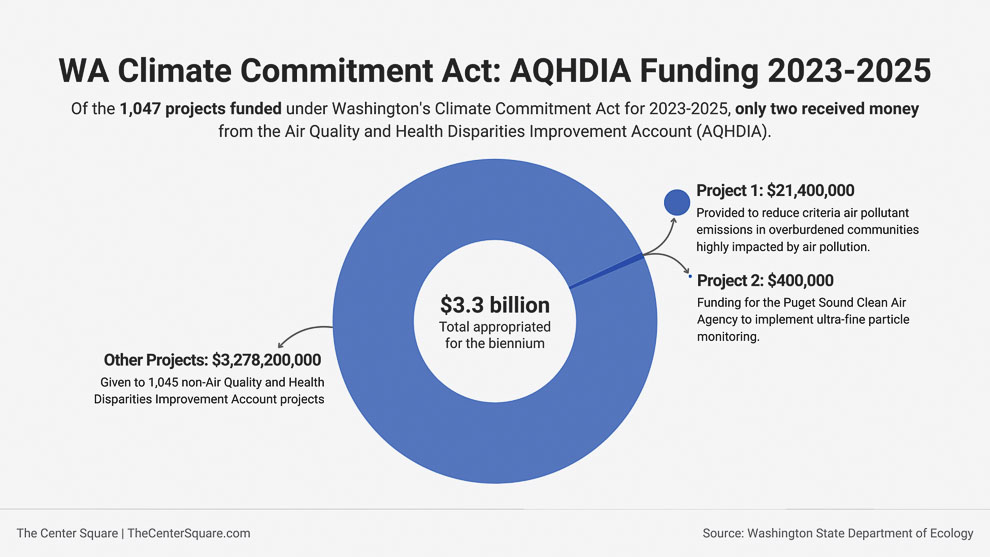
The Washington State Department of Ecology reported in November that $472 million of CCA funds were spent during the fiscal year 2024
TJ Martinell
The Center Square Washington
Although the 2021 Climate Commitment Act’s primary goal is to reduce carbon emissions, supporters defending it against a failed initiative last year argued the revenue generated by it was vital to support air quality projects.
However, an analysis of CCA money spent from an account specifically meant for those projects found it made up roughly .1% of the total spending for the 2024 fiscal year.
CCA revenue is deposited into three main accounts, with two of those accounts having two sub accounts each. Among them is the Air Quality & Health Disparities Improvement Account, the funds of which are “to be used for projects that result in long-term environmental benefits and increased resilience to the impacts of climate change such as improving air quality through the reduction of criteria pollutants, and reducing health disparities in overburdened communities by improving health outcomes through the reduction or elimination of environmental harms and the promotion of environmental benefits.”
The Washington State Department of Ecology reported in November that $472 million of CCA funds were spent during the fiscal year 2024. Of that, .1%, or $596,000, came from the air quality account for two projects.
Those two projects were to “reduce criteria air pollutant emissions in overburdened communities highly impacted by air pollution” and for the monitoring of ultra-fine particles by the Puget Sound Clean Air Agency.
In total $21.8 million, or .64%, of the $3.3 billion in CCA revenue appropriated for the 2023-25 biennium came from the air quality account, all of which is directed at the two projects, while there were more than 1,000 projects allocated CCA money for the same time period. Meanwhile, roughly 89% of project spending in fiscal year 2024 did not have any impact to carbon emissions, while 45% of the spending was on transit related projects.
According to Ecology, the agency is working on improving air quality in 16 Washington communities that are “historically overburdened with health, social, and environmental inequities and are highly impacted by criteria air pollution, such as ozone and fine particles.” The state agency reports that those communities are a combination of urban, suburban, and rural and range from populations of 1,500 to more than 200,000 residents. Altogether, the 16 communities have 1.2 million people, 15.5% of the state’s total population.
The CCA will also be funding a $10 million grant program to support local projects aimed at reducing air quality, with qualified applicants including tribes and local governments.
According to Ecology, all of Washington, except a small area in Whatcom County, currently meets air quality standards.
However, Washington Policy Center’s Vice President of Research Todd Myers told The Center Square he’s skeptical more CCA spending would have an effect; he noted in 2019 that an Ecology study cited by the Puget Sound Clean Air Agency found a proposed low carbon fuel standard wouldn’t have an effect on air quality, as it is projected to improve regardless.
“Air quality is getting much better,” he said. “Transportation has a relatively low impact on air quality. When we miss air quality targets, it’s never because of traffic and smog. It’s because of wood burning stoves.”
Ecology oversees the Wood Smoke Reduction Grant Program, which provides funding for the transition of homes reliant on wood burning stoves to either natural gas or electricity. In place for 17 years, the state Legislature typically allocates $3 to $4 million for the program, which has replaced more than 7,000 wood stoves. The revenue for the grant program comes from the Model Toxics Control Act Capital Account.
This report was first published by The Center Square Washington.
Also read:
- Hockinson Blueberry Festival Returns Saturday, July 19The Hockinson Blueberry Festival returns July 19 with berries, contests, live music, and handmade goods at the Hockinson Community Center.
- New Les Schwab Tires store in Brush Prairie expands services in Vancouver areaLes Schwab will open a full-service tire and auto store in Brush Prairie on July 23, bringing new jobs and expanded services to the Vancouver area.
- Opinion: When bad policy fail real peopleAmy Harris says Vancouver’s failure to address street safety led to a fire that shut down a beloved immigrant-owned restaurant.
- Opinion: Fantasy math – Why the CBO’s numbers don’t add upNancy Churchill argues the CBO’s deficit math ignores key growth effects and revenue streams, calling its models misleading and politically biased.
- Re-Imagined Radio pays tribute to Bogart and Bacall in two-part seriesRe-Imagined Radio will honor Bogart and Bacall with two radio episodes airing July 21 and Aug. 18.
- Plan ahead for ramp closures on I-5 near Ridgefield, July 9-10WSDOT will close three I-5 off-ramps near Ridgefield July 9–10 to test wrong-way detection systems and improve safety.
- Commission on Aging to discuss ‘Aging in Place’Clark County’s Commission on Aging will hold a hybrid meeting July 16 to discuss “aging in place” services and housing options for older adults.











